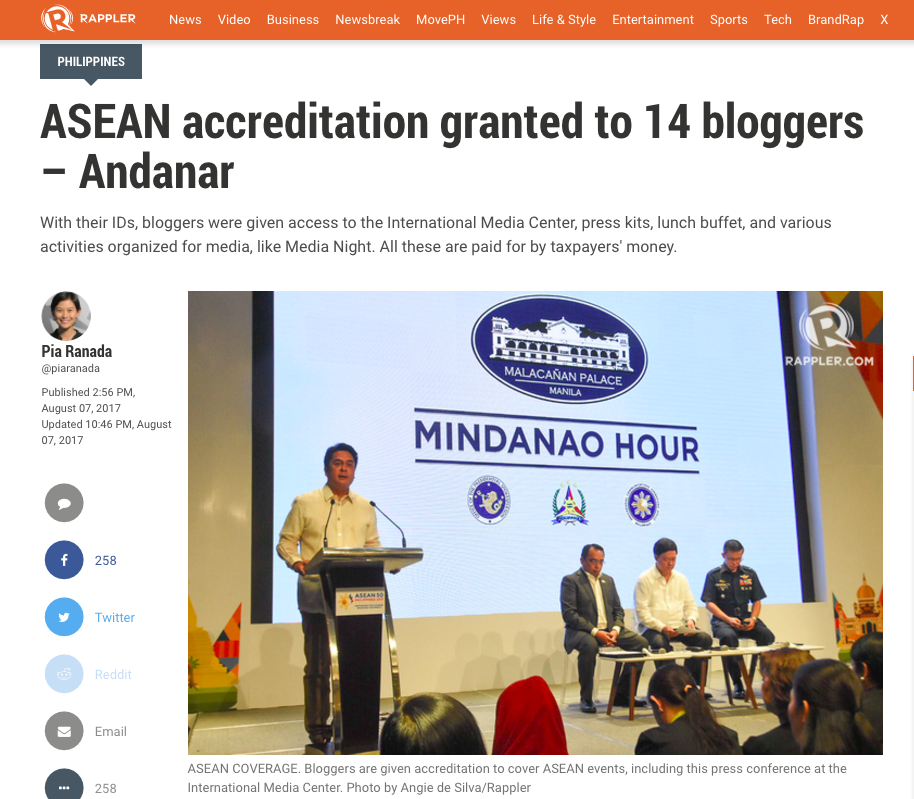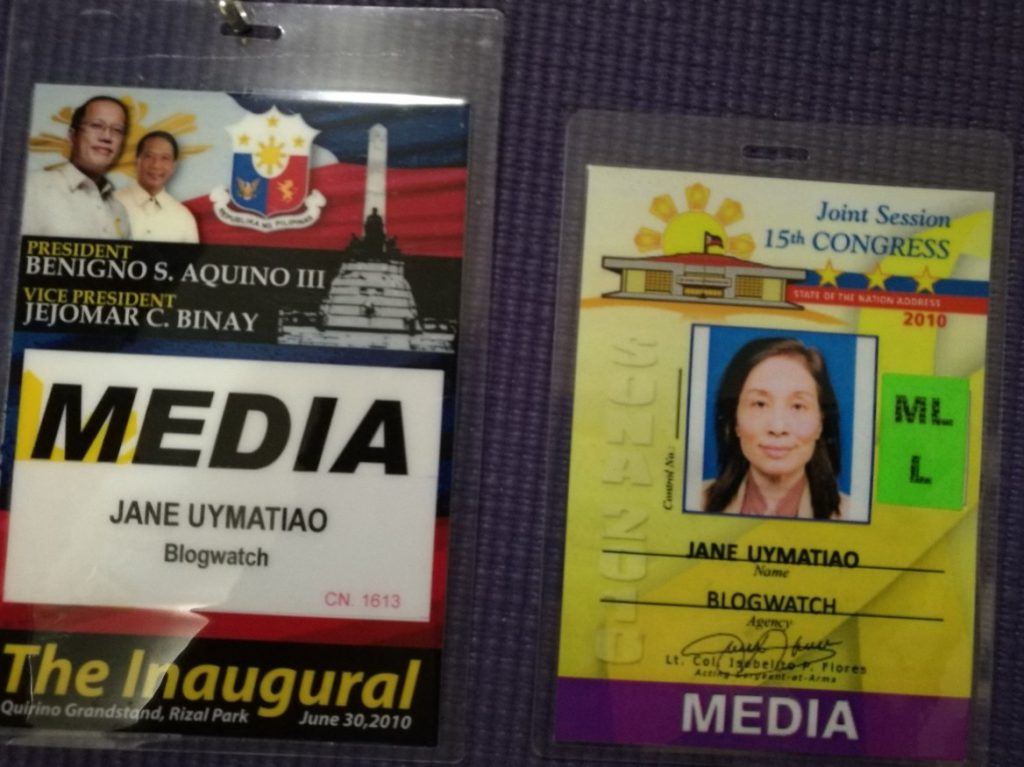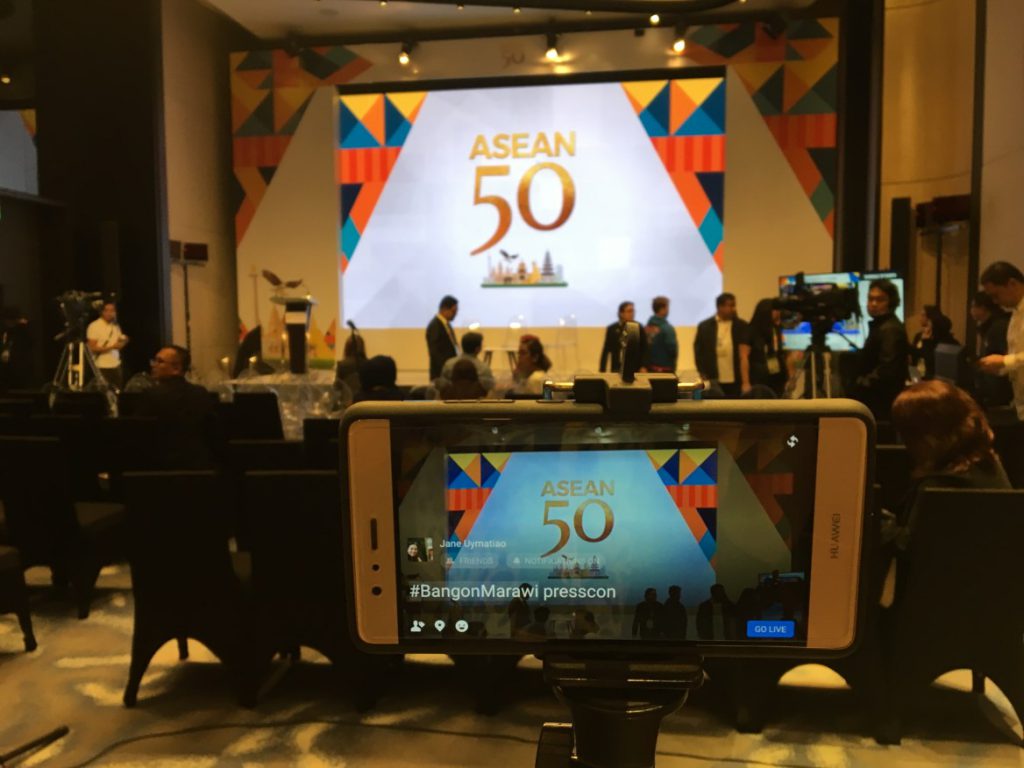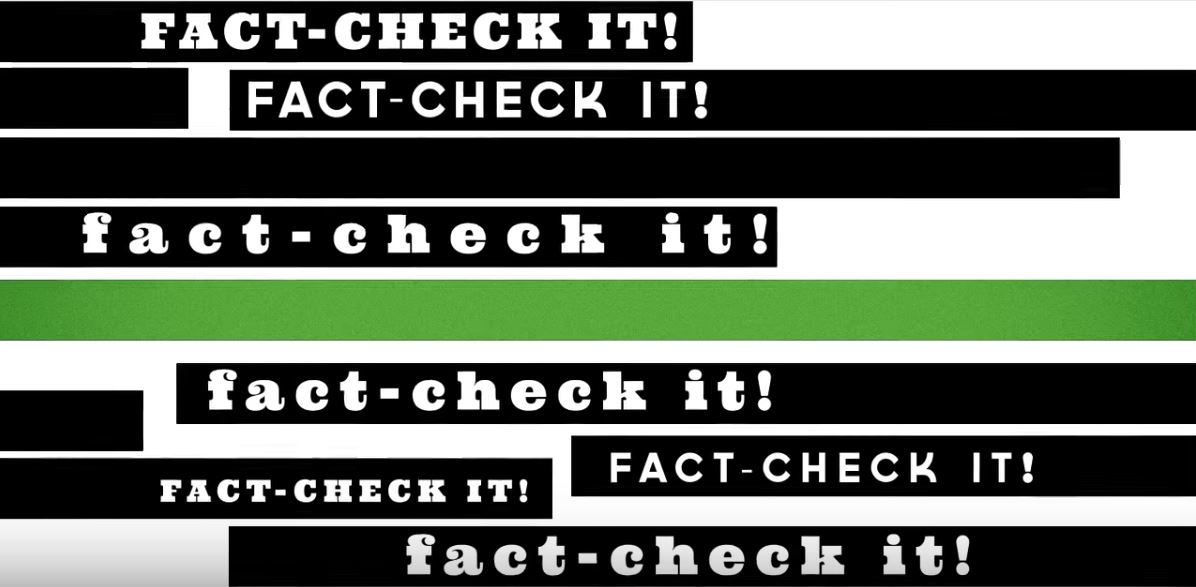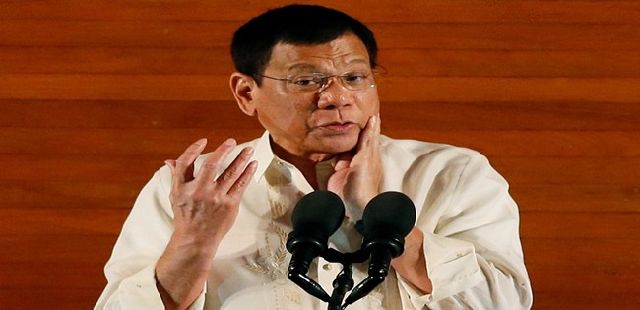What is all this ado about bloggers at #ASEAN2017?
(first published at What is all this ado about bloggers at #ASEAN2017? )
I am compelled to write this piece, if only to document our ongoing struggle to make citizen engagement in the Philippines a NORMAL part of participatory governance. It is a constant uphill battle that is often tiring, makes me question why I even want to go on with a thankless job (oh, I do not even draw any salary so it is not a job!), and just go on with my peaceful apolitical life as it used to be before 2009.
I am one of the “14 bloggers” the Palace accredited to cover the 50th anniversary of the Association of SouthEast Asian Nations (ASEAN). The better phrase to describe us actually is “citizen advocates”. With me were Noemi Dado and Sonnie Santosfrom Blogwatch and an independent blogger-advocate, Tess Termulo, who is a practicing doctor in a government hospital. I cannot speak for the other bloggers who are not part of my usual circle of bloggers.
A Rappler article by Pia Ranada dated August 7, 2017, “ASEAN accreditation granted to 14 bloggers – Andanar”, contained statements which, in the absence of any qualification, makes me assume they were directed at all 14 of us who covered the recent ASEAN events from August 2-8. I will respond to each of Ms. Ranada’s statements below but first, I would like to say that not all bloggers are citizen advocates like me; conversely, not all citizen advocates are bloggers. I just happen to be all this rolled into one, including being a social media practitioner.
Citizen advocates want to engage government (participatory governance).
This has been our message to the previous administrations, to this one, and the administrations to come — LET’S TALK AND CONVERSE. TELL US YOUR PLANS. LISTEN LIKEWISE TO WHAT WE CITIZENS HAVE TO SAY ABOUT YOUR GOVERNANCE.
From the time Blogwatch started in November 2009, I already knew what we WERE NOT. We were not journalists. What we wanted was constructive conversation where ordinary citizens could come closer to its government and the policy/law makers in a more direct way.
The breakthrough came in 2010 when the Aquino administration became open to allowing bloggers more access to the Palace. Despite the lack of media credentials (we began Blogwatch only in November 2009), we were allowed to cover the inauguration of then Pres. Aquino, both at Luneta and at Malacanang. This was followed by access to SONA 2010, the first 100 days of Pres. Aquino, and the 25th anniversary of EDSA.
READ OUR STORY: Blog Watch: A microcosm of the evolution of citizen engagement in the Philippines
If there is anything positive that I attribute to the Aquino administration concerning citizen engagement, it is that they were the first to open the doors to citizens. Unfortunately, those doors did not stay open long. When we started questioning and disagreeing with some policies, including the Disbursement Acceleration Program (DAP), they shut the door.
With a new administration, we are once again hopeful that citizen engagement will finally take off. Presidential Communications Operations Office (PCOO) Sec. Martin Andanar has shown a willingness to give access for bloggers and social media practitioners to cover government events. I like his inclusivity mindset. However, we made it clear to him that as advocates, we were not just message carriers for the government; we would speak our minds freely on matters of governance, positive or negative. Unfortunately, the recent social media accreditation guidelines issued was not quite what we hoped for. But that is for another blog post.
Back to the Rappler article…
There are two paragraphs in Ms. Ranada’s article that I specifically took exception to. The first paragraph, found somewhere in the middle of the article, goes: “With their IDs, bloggers were given access to the International Media Center, press kits, lunch buffet, and various activities organized for media, like Media Night. All these are paid for by taxpayers’ money.” This same section is a prominent introductory snippet found just below the article’s title.
This is followed by another paragraph that goes: “Rappler saw tables at the IMC in which seats were reserved for some bloggers. Such perks are typically given to mainstream media in cognizance of their role in reporting about the ASEAN meetings for the public good.”
Let’s address these points.
Ranada: “With their IDs, bloggers were given access to the International Media Center, press kits, lunch buffet, and various activities organized for media, like Media Night. All these are paid for by taxpayers’ money.” (underscoring is mine)
Did she imply that we were at ASEAN for fun and food at the expense of taxpayers’ money? I cannot let this pass.
First, I was at #ASEAN2017 as a citizen advocate who just happened to be a blogger and social media practitioner. It was not my job to cover ASEAN but since we had long been covering local government and private sector advocacy events, I wanted to expand my appreciation of an important regional event. I applied with the Presidential Communications Operations Office (PCOO) media accreditation group using their website form and submitted the required documents and ID picture with white background.
I took my accreditation seriously. So did my colleagues. On all days we were there, we had our equipment including laptops, tablets, smartphones, selfie sticks and tripods. Noemi even brought her Go Pro. We live tweeted and live streamed, read the press materials given at IMC, and queued for media signups to cover special events open to us.
Second, with all advocacy events I cover, I inevitably have to SPEND MONEY. Unlike media who can reimburse stuff like transportation, food and whatever else because they work for a media outlet, I have to dig from my own pocket just to cover such events. I bring a car and a driver. I spend for gas. I pay for the driver’s meal/s, toll (if any), parking. These are all non-reimbursable. My advocacy goes beyond just government. I also support the advocacy events of the private sector on days when I am free. Believe it or not, there are also other citizens who commute to attend similar fora. Many even pay for their own Uber/Grab transportation (no reimbursements either).
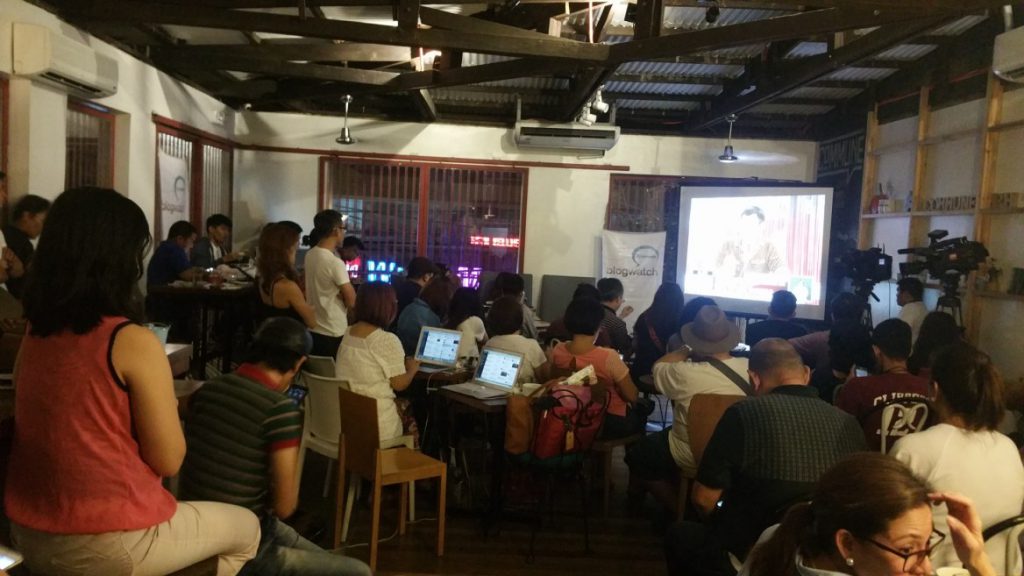
So… enough of these insinuations that we were out for a good time at ASEAN at taxpayers’ expense. NO. We did what we set out to do — to bring the ASEAN experience to our social media community in our own way. Our ASEAN participation does not stop with this last ASEAN celebration. Even now, some of us are brainstorming on how we could bring together more citizens from the different ASEAN nations into a social media community.
One last word on this topic. I was NOT at Media Night.
Ranada: “Rappler saw tables at the IMC in which seats were reserved for some bloggers. Such perks are typically given to mainstream media in cognizance of their role in reporting about the ASEAN meetings for the public good.”
I can almost hear the subliminal messaging – feeling privileged and entitled.
Ms. Ranada must have been referring to the Bangon Marawi briefing last August 4 when she mentioned seat reservations because that was the only time the bloggers were seated together inside the briefing room. Here is the story from my point of view.
My colleagues and I were unaware that seats were supposedly reserved for bloggers. Noemi was at the hotel at 7am and there were no media around yet. Seats were free for the taking. She took the first row of the middle section of the briefing room. I arrived just past 7am and placed my things on the seat beside Noemi. We stayed outside the briefing room though because the room was very cold. Sonnie, who arrived soon after, also took the seat near us.
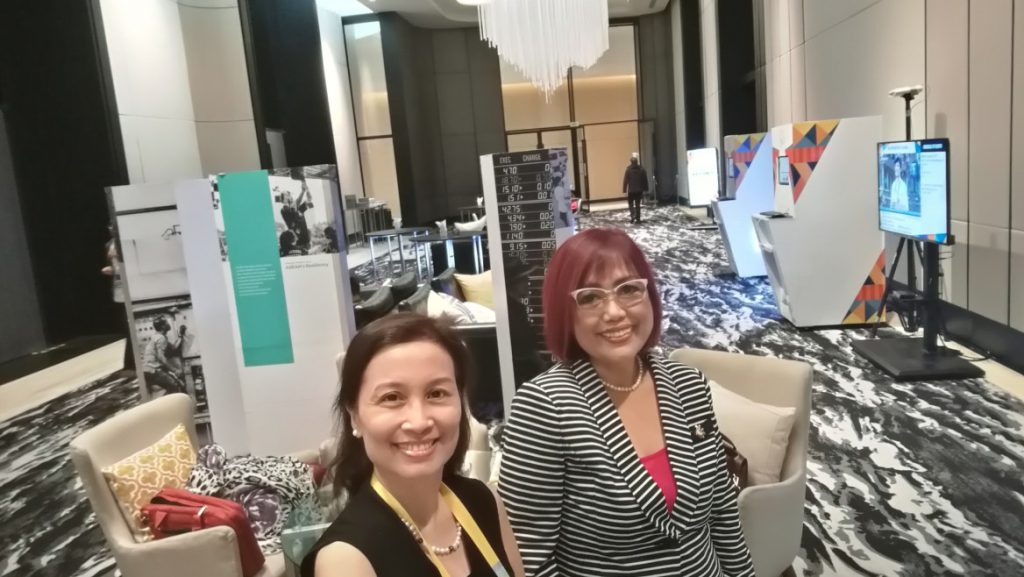
Inside the briefing room, PCOO staff came to us and told us there were reserved seats for bloggers at the back. Noemi and I refused to move from our seats because we were already set up and were planning to live stream. As everyone knows, our cameras are only from our smartphones, unlike mainstream media whose bulky cameras have powerful zoom capability. From past coverage, we have learned already to strategize where to sit to avoid being totally blocked by the tripods and huge cameras of media outlets. We also try to be as early as possible so we can get the best seat view.
I don’t think anyone has exclusive right over what is considered “public good”. If media is covering ASEAN for public good, I also want to think that our work as citizen advocates (without salary and oftentimes shelling out our own money as I described above) just to engage government is also public good.
Just for the record, this is not the first time we applied for accreditation to cover an international event.
I could not apply for accreditation during the Asia-Pacific Economic Cooperation (APEC) Summit in 2015 due to a yin yoga teacher training I had already committed to. But my Blogwatch colleague, Noemi Dado, did. Sadly, hers was initially approved, then revoked. For what reasons, we still do not know. I am posting below the emails she received, with her permission.
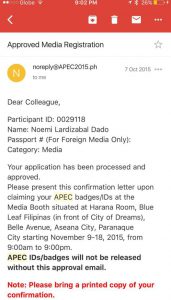
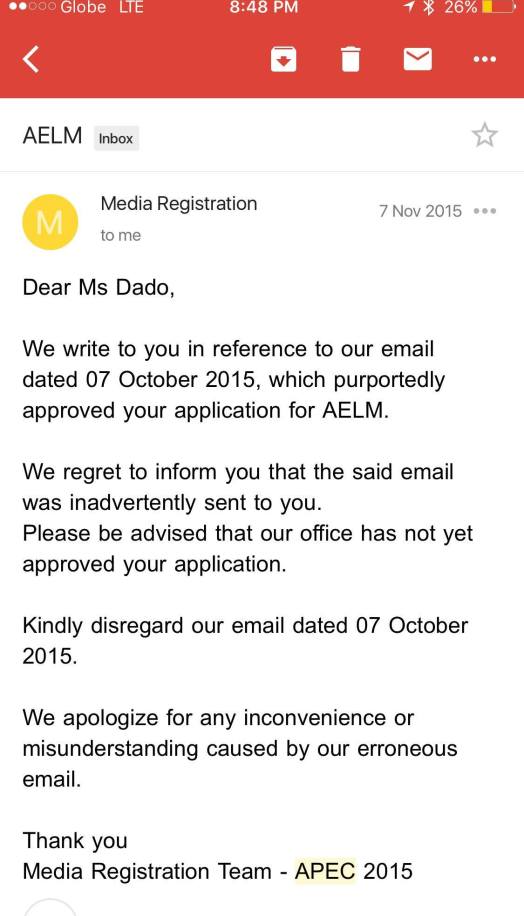
The world of communication is changing and social media is one of those disruptive phenomena that are changing how things are done in media.
Bloggers occupied online space long before mainstream media went into online publishing and began including social media in its reportage. However, the opposite is happening too. Social media is allowing citizens like me to get nearer and up close to government. Our opinions and feedback, once confined to our circles, can now be public discussions online. And they sometimes heat up. But that is democracy.
I have always believed that mainstream media and proactive citizens, combined, are a potent force in governance. Journalists, well trained in the Who, What, Where, How, and Why, report the facts. Citizen advocates and other social media people use these facts to form opinions and decide how to push the envelope further by engaging public servants. I am hoping we can one day find that middle ground where journalists and citizen advocates can coexist, cooperate, and co-influence — all for public good.
Maybe it is time for us to meet you, Ms. Ranada. I think you will find that we have more in common for the good of this country.

